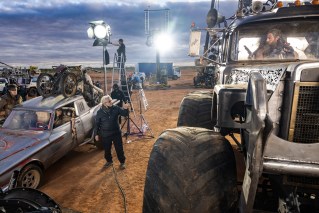Calls to boycott Disney’s live-action Mulan over hat tip in credits to Xinjiang authorities
There have been fresh calls to boycott the new live-action remake of Mulan after Disney included a thanks in the credits to Chinese government authorities who have been linked to human rights violations.
The film, a remake of the much-loved 1998 animated movie, has been embroiled in controversy after one of the stars publicly supported police cracking down on independence protests in Hong Kong.
Mulan, which premiered in Australia on Disney’s online streaming service Disney+ on September 4, was filmed primarily in New Zealand and China, including desert scenes subtitled as “north-west China”.

The hashtag #BoycottMulan first started trending last year after Mulan star Yifei Liu tweeted in support of police during the Hong Kong protests. Photo: Disney
In 2017, the New Zealand director of the $US200 million ($275 million) film, Niki Caro, posted on Instagram location scouting photos taken of sand dunes tagged at Urumqi, the capital of the Xinjiang Uyghur Autonomous Region.
The Chinese government has been widely condemned for its detention and surveillance of Uyghurs and other Muslim minority groups in Xinjiang.

A shot from Mulan describes the setting as “Northwest China”.
There have been allegations of forced sterilisation of Uyghur women, forced labour in factories, and other measures amounting to what has been described as cultural genocide.
However, the government has repeatedly denied its “vocational training centres” are concentration camps, and says the measures are necessary to counter what it calls extremism and terrorism.
Mulan specifically thank the publicity department of CPC Xinjiang uyghur autonomous region committee in the credits.
You know, the place where the cultural genocide is happening.
They filmed extensively in Xinjiang, which the subtitles call “Northwest China”#BoycottMulan pic.twitter.com/mba3oMYDvV
— Jeannette Ng 吳志麗 (@jeannette_ng) September 7, 2020
In Mulan‘s credits, Disney offers “China Special Thanks” to the Publicity Department of CPC Xinjiang Uygher Autonomous Region Committee as well as the Publicity Department and Bureau of Public Security for the city of Turpan, which is north-east of Urumqi in Xinjiang.
The United States Department of Commerce’s Bureau of Industry and Security in October last year added the Turpan Municipality Public Security Bureau to a list of Chinese entities “acting contrary to the foreign policy interests of the United States”.
“Specifically, these entities have been implicated in human rights violations and abuses in the implementation of China’s campaign of repression, mass arbitrary detention, and high-technology surveillance against Uighurs, Kazakhs, and other members of Muslim minority groups in the XUAR [Xinjiang Uygher Autonomous Region],” the Department of Commerce said in a notification of the listing.
Human Rights Watch’s China director Sophie Richardson told the ABC that Disney’s public thanks raised questions about whether and how the company engaged with authorities in Xinjiang.
Ms Richardson questioned whether Disney thought through how that relationship would be perceived “at a time when most of the global discussion about Xinjiang is about appalling mass detention of people outside of any legal process on the basis of their ethnic and religious identity, about forced labour, torture and unparalleled destruction of religious freedom”.

The animated version of Mulan was released in 1998.
“For any company, critical to these kind of engagements is having done some sort of human rights due diligence, which is what the United Nations guiding principles on business and human rights requires,” she said.
At this point, any kind of co-operation with authorities in Xinjiang should absolutely raise red flags for any international company.
“I think it’s incumbent on Disney to explain what human rights due diligence they did in advance of co-operating with these authorities.”
Last year, the hashtag #BoycottMulan started trending on Twitter after Chinese-American actor Yifei Liu, who plays the heroine in Mulan and has more than 66 million followers on Chinese social media platform Weibo, shared a post supporting police cracking down on independence protesters in Hong Kong.
She added an “IAlsoSupportTheHongKongPolice” hashtag with heart and arm-flexing symbols.
In February, Yifei was less strident in her opinion when interviewed by the Hollywood Reporter.
“I think it’s obviously a very complicated situation and I’m not an expert,” she said. “I just really hope this gets resolved soon.”
While Mulan is an online-only offering in the US and Australia, it has begun showing in theatres in Thailand, Taiwan, the Middle East, Singapore and Malaysia.
It will premiere in movie theatres in China next week.
Disney did not respond to questions from the ABC.








